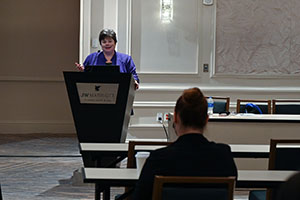
Life can be stressful; between daily hassles, personal stressors, and cataclysmic events finding time to care for oneself is scarce.
However, when COVID-19 hit, the time we took to ourselves became even more limited. AACRAO Board Member, Sherry Waldon-Wells, shared her personal experiences at the #SEM2021 Conference on how to manage these challenges throughout her life and career with "humor, grace, therapy, medication, and sometimes a little bit of alcohol." Her session is titled "The Sandwich Generation"—what is the Sandwich Generation, you may ask?
The Sandwich Generation is defined as a generation of people, usually in their thirties or forties, responsible for bringing up their own children and for the rest of their aging parents at the same time.
Although we commonly see how individuals attempt to balance their time and energy between their children and their parents, there is more than one definition to the Sandwich Generation. Additionally, The Sandwich Generation comes in many different varieties; for example, we often think about balancing one's career and education on top of other responsibilities.
Sherry shared some key statistics in her presentation that showed the prevalence of this phenomenon amongst millions of United States citizens:
48 million adults in the United States are unpaid caregivers
24% of those caregivers are caring for more than one person
nearly 50% of these individuals use personal savings and cut back on spending
60% of caregivers are full-time or part-time employees
She also shared some strategies to overcome these challenges. The first step is to prioritize. It is unrealistic to promise equal shares of your time to others. We must provide care by need, not by "fairness." As the people in our lives experience ups and downs, it is the responsibility of the caregiver to recognize when one individual needs more help and how to address those needs first, which leads to the next step in approaching life's significant troubles: time management. Working professionals often find themselves drowning in tasks and reminders, and it's easy to get overwhelmed. However, it's also important to note that refining time management skills is not a linear learning process—it takes practice and dedication. The third step is to learn how to multitask; time is limited, and we must assess how to balance tasks to align with each other. The next step is to communicate. As difficult as it may be for some individuals, it is acceptable and sometimes necessary to ask for help or delegate tasks when you need assistance. In the professional realm, be open to asking for additional accommodations in your institutions; this may be through family leave, working remotely, or flexible schedules. The final and most challenging strategy is to take care of yourself. To better help others, you must allow yourself time to decompress and organize yourself.
What happens if you're not in the Sandwich Generation? The concern remains. Your faculty, staff, colleagues, and students can be in the Sandwich Generation. What's affecting them may inadvertently affect you; productivity, retention, and attendance may change. Therefore, it's essential to recognize and respect others experiencing life's difficulties and how to best support those individuals and provide the resources necessary to assist them.
Have you found yourself in the Sandwich Generation? Reach out to Sherry to hear more about her personal experiences and how to overcome life's big—and small—challenges.